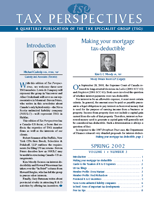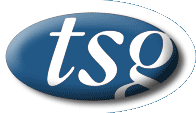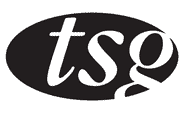
PDF Format
 Issue Contents Issue Contents
 All Issues All Issues
Spring 2002
Volume 1, Number 3
The information in Tax Perspectives is prepared for general interest only. Every effort has been made to ensure that the contents are accurate. However, professional advice should always be obtained before acting on the information herein.
In Brief — News of Important Tax Developments
By Howard L. Wasserman, CA, CFP, TEP
Cadesky and Associates LLP (Toronto)
Foreign trusts are still foreign On December 17, 2001, the Department of Finance issued a news release in which it announced a one-year delay in the effective date of all proposals affecting nonresident trusts and foreign investment entities. This means that these rules will now come into effect on January 1, 2003. This delay is significant because it means that one has until the end of 2002 to complete any tax planning done in contemplation of the new rules. It appears that the government received many detailed submissions on the rules and wanted to review them carefully before finalizing the proposed legislation. We anticipate that revised proposals will be released by the spring. It is important for all individuals with ties to foreign trusts to have their situations reviewed before 2003. Late-filing subsection 216 tax returns Non-residents of Canada who receive rent from Canadian properties have the choice of paying 25% withholding tax on their gross rental income or paying tax at regular rates on their net rental income. In many circumstances, tax payable on net income is far less than the 25% withholding tax. In order to pay tax on the net rental income and avoid the 25% withholding, the non-resident should file an NR6 form before the calendar year commences, showing expected net rental income, and then file an income tax return within six months of the year-end. If no NR6 form has been completed, the 25% withholding will apply, but can be claimed back by filing an income tax return within two years of year-end. It is important to note that if these elective tax returns are not filed on time (within six months or two years, depending on whether an NR6 form was filed), there is currently no mechanism for the CCRA to accept them. This is unfortunate, considering that net income from rental activities may actually be nil. Being liable for 25% withholding tax on gross rents is, therefore, a real hardship. It now seems, however, that the CCRA is changing its hard-line position on late-filed returns. The CCRA recently sent letters to various non-residents stating that they had "one opportunity to late-file a return for any previous year." This means that a non-resident may be able to catch up for all outstanding years. The CCRA will not accept a latefiled return if there was correspondence between the CCRA and the non-resident that a tax return was required or if actions have commenced against the non-resident to enforce the legislation. In essence, the non-resident must make a voluntary disclosure. Where a late-filed return is allowed, the government will assess arrears interest on the withholding tax that has not been deducted or withheld, as well as on any amount of income tax that the non-resident owes. Corporate instalments In the federal budget of December 10, 2001, the government announced a deferral of corporate tax instalments for small businesses. It proposed to defer the federal income and capital tax instalments for January, February, and March 2002 for at least six months. Therefore, any instalments that would otherwise be due for these months may be deferred, provided that the taxable capital employed in Canada is under $15 million. Ontario has also announced that corporations that have income and capital tax between $2,000 and $10,000 can now make quarterly, rather than monthly, tax instalments. Tax rates decline Although federal tax rates for individuals remain unchanged, provincial rates for 2002 have been dropping in British Columbia, Saskatchewan, and Quebec. Of course, many provinces will have budgets in April or May, and more rate reductions may be in store. The lowest taxing province remains Alberta, where the maximum combined rate for individuals is 39%. Corporate tax rates are dropping in the prairie provinces for small business, and the tax rates for corporations in the highest bracket are being reduced by 2%. Every bit counts!
| 



